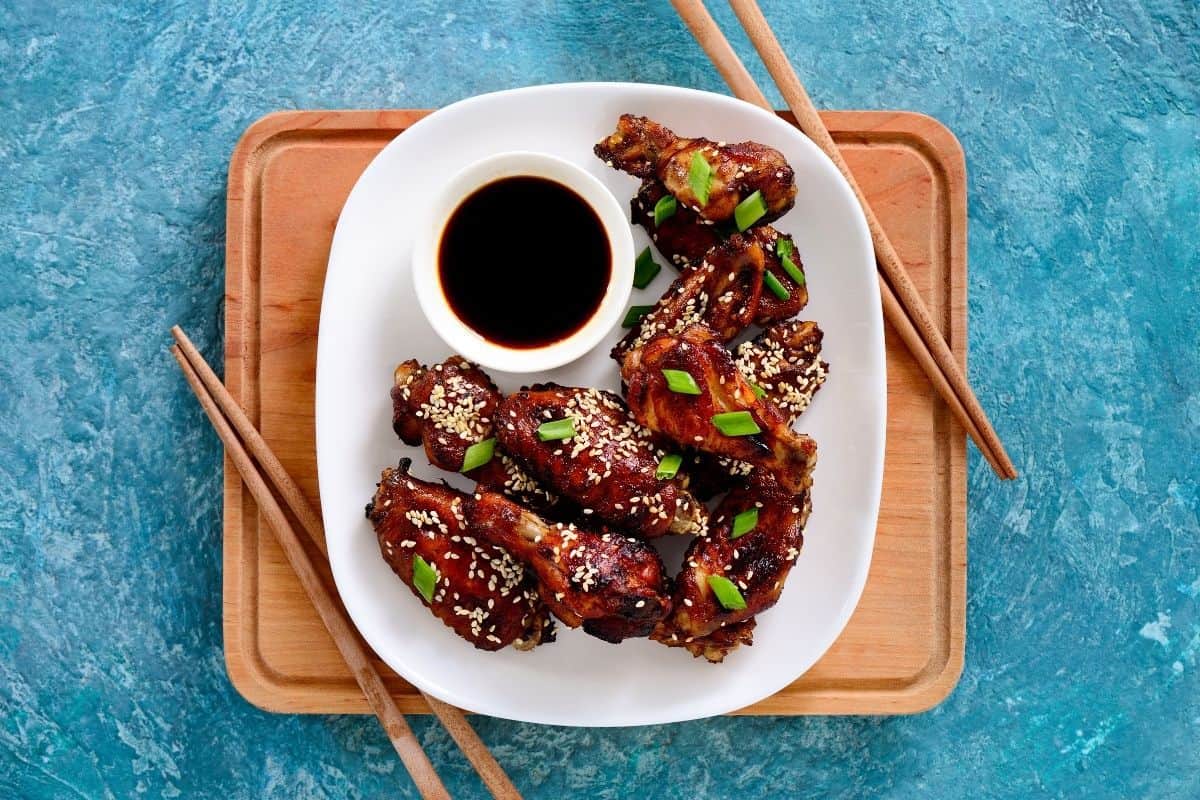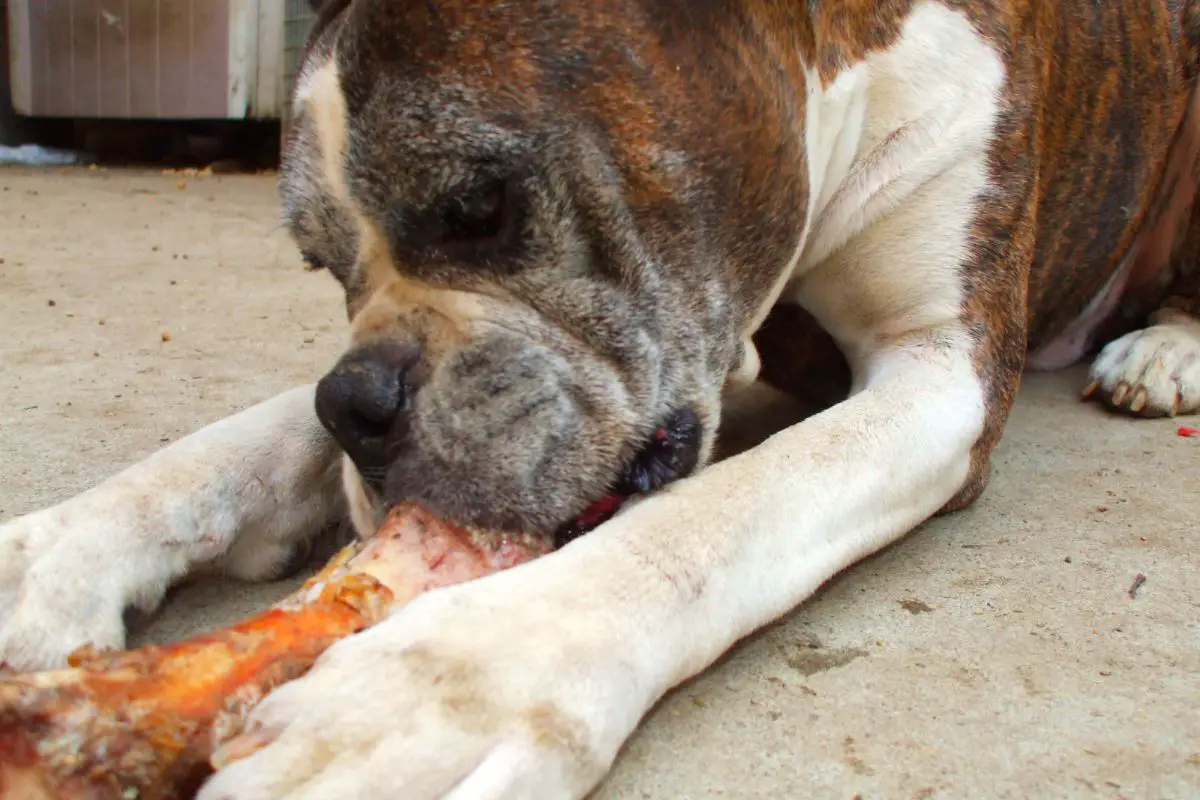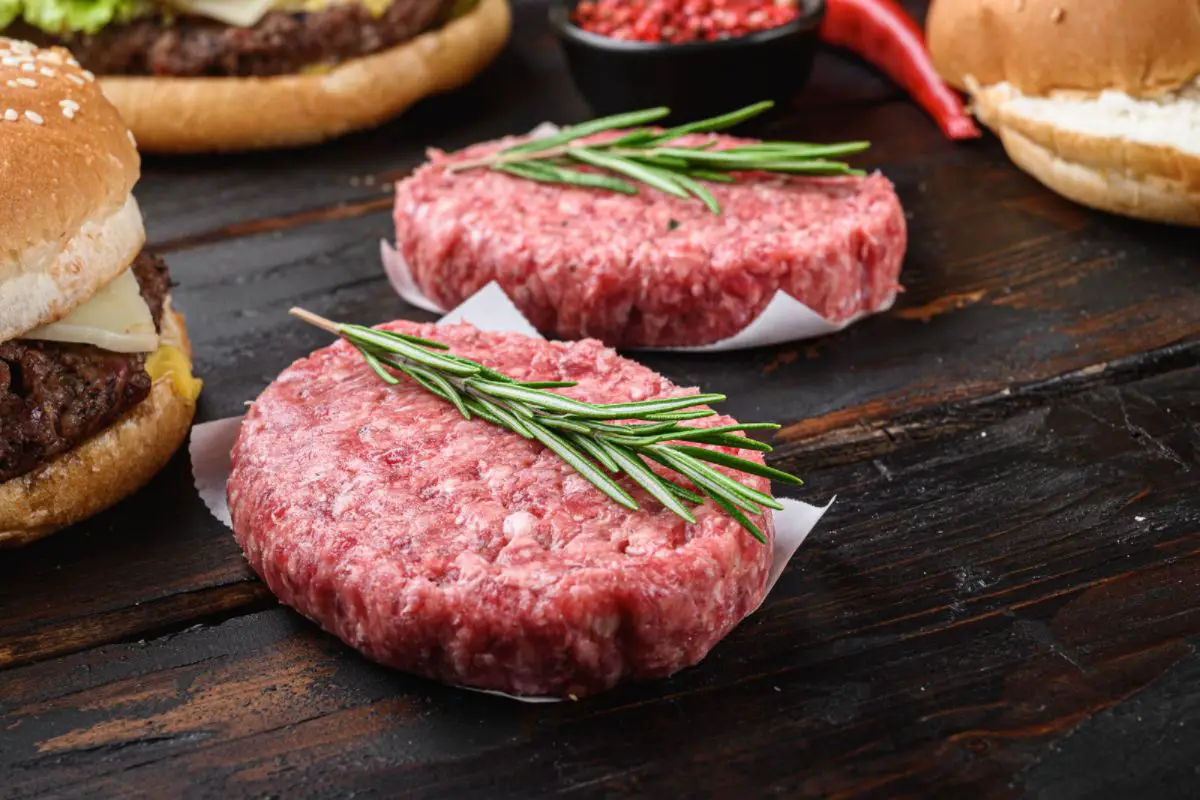Responsible pet owners should consider all of the ingredients in food before offering it to their pets. Teriyaki sauce is one of those foods that may seem healthy for dogs, as it’s just meat and sauce, after all. But in reality, is it considered unsafe for canine consumption?
Dogs shouldn’t eat teriyaki, as it’s not safe for them. This sauce contains ingredients that are unsafe for a dog to consume, including soy sauce, rice wine, sugar, and garlic. Some sugar-free teriyaki sauces contain xylitol, a sugar alcohol that’s toxic to dogs.
Knowing exactly what’s in teriyaki sauce and how those ingredients affect your dog is critical to understanding why this food is dangerous. Read on to learn more about teriyaki, its ingredients, and how it affects canines.
Teriyaki Sauce Ingredients
Teriyaki is a cooking method where meat is broiled or grilled with soy sauce, mirin (rice wine), and sugar.
The Japanese word “teri” (照り) translates to “shine” in English, and yaki (焼き), translates to grilled. “Shine” refers to the glaze of the sauce caused by the added sugar and cooks brush the sauce onto the meat as it cooks.
Below, we’ll discuss the traditional ingredients used in teriyaki sauce and how these ingredients affect dogs.
Soy Sauce
Soybeans are the main ingredient in soy sauce. While not dangerous to dogs in moderation, soy is a common allergy in canines. However, soybeans aren’t the most concerning ingredient in soy sauce, as sodium is an even bigger issue.
According to the United States Department of Agriculture, one tablespoon (14.79 ml) of soy sauce contains a whopping 780 milligrams (0.03 oz) of sodium. This high sodium content makes soy sauce dangerous for dogs.
Dogs that consume more than a teaspoon of soy sauce are at risk of sodium poisoning.
Mirin
Mirin is a type of rice wine similar to sake and a common ingredient in Japanese cooking.
It contains a lower alcohol content than sake, but it has higher sugar content. The sugars in mirin are natural, not added. In most cases, wine won’t hurt a dog in small amounts, but Japanese wine is typically sweeter than traditional wine.
Therefore, mirin is higher in calories which could contribute to obesity.
Sugar
Sugar isn’t considered toxic to dogs, but in high amounts, it contributes to obesity. Obesity in dogs may cause diseases like diabetes, heart disease, and hypertension. Dogs that consume foods containing high amounts of sugar are also at a higher risk of dental problems.
Other Ingredients
Teriyaki sauce often contains other ingredients, including garlic, xylitol, and coloring agents, which create added hazards for your pet. Let’s take a look at some of these extra ingredients.
Garlic
Garlic contains a compound called thiosulfate, which is toxic to canines when consumed in large amounts and it can lead to red blood cell damage. Fortunately, it’s often difficult for a dog to consume the amount of garlic it takes to harm them.
It takes around 15 g (0.03 lb) of garlic per kilogram (2.20 lbs) of a dog’s weight to pose a health risk. One clove of garlic weighs approximately 5 g (0.01 lb), so a 2 kg (4.41 lbs) dog would need to consume 30 g (0.07 lb) of garlic or six cloves, to cause any significant health issues.
With that said, it’s still best to avoid garlic in your dog’s diet, as there’s still a risk.
Xylitol
Xylitol is a sugar alcohol found in sugar-free drinks, sauces, candies, and gums, and is highly toxic to dogs, even in small amounts. Within a few hours of consumption, xylitol causes a dangerous drop in blood sugar.
If you don’t seek medical help, it can cause liver failure. If your dog consumes any amount of xylitol, take him to an emergency vet immediately.
Caramel Color
In addition, some soy sauces contain added ingredients, such as caramel coloring. The California Office of Environmental Health Hazard Assessment lists caramel color as a chemical known to the State to cause cancer or reproductive toxicity.
What To Expect if Your Dog Consumes Teriyaki
If your dog ingests a small amount of teriyaki, it may not be a cause for concern.
Keep your eye on him and watch for any symptoms, including vomiting or diarrhea. If these symptoms continue for more than 24 hours, take him to your veterinarian’s office or an emergency vet clinic.
Sodium Poisoning in Dogs
Any amount of soy sauce over a teaspoon (4.93 ml) is dangerous to dogs and may lead to sodium poisoning, which can be fatal in dogs, especially smaller dogs.
Dogs that consume excessive amounts of teriyaki may show signs of sodium poisoning, including:
- Fast heart rate
- Weakness
- Muscle tremors
- Excessive thirst
- Lethargy
- Confusion
- Seizures
If your dog shows any of the above signs, take him to an animal hospital immediately. In addition, if your dog consumes teriyaki that contains xylitol, he needs an urgent assessment at a veterinary clinic or hospital.
Can Dogs Eat Teriyaki Chicken?
Chicken is an excellent source of protein for dogs and probably one of his favorite meats. While protein is an essential nutrient vital for the health of canines, chicken isn’t the only ingredient in teriyaki chicken.
Dogs shouldn’t eat teriyaki chicken. Plain chicken is suitable for canine consumption, but the addition of teriyaki sauce makes it potentially dangerous. Teriyaki sauce contains high sodium and sugar levels which may cause health problems for your pet.
Teriyaki chicken tastes and smells delicious, and your dog is likely to notice. You shouldn’t give in to his desire to indulge in this Japanese dish, however, as it could lead to severe health problems.
Fortunately, there are ways for dogs to enjoy dishes similar to teriyaki chicken, as we’ll discuss further in the next section.
Is Homemade Teriyaki Safe for Dogs?
Dogs should avoid store-bought, restaurant-prepared, and homemade teriyaki, especially when prepared with traditional ingredients.
Homemade teriyaki sauce isn’t safe for dogs when prepared with traditional Japanese ingredients (soy sauce, mirin, and sugar). Pet owners may try a “mock teriyaki sauce” as a substitute, as long as it’s prepared with safe ingredients.
Mock teriyaki may be consumed by dogs in moderation. It’s not authentic teriyaki, as it substitutes most of the harmful ingredients in the traditional sauce—but your dog probably won’t mind.
To make “mock teriyaki,” use the recipe below.
Safe Teriyaki Sauce Recipe for Dogs
Even though this recipe contains safe ingredients, pet owners should only feed this sauce to dogs in moderation, as it still contains sodium, fat, and sugar that dogs shouldn’t consume in large amounts.
The ingredients for the mock teriyaki sauce includes:
- 6 tbsp (88.72 ml) liquid aminos – This is a substitute for soy sauce. Liquid aminos are essentially proteins in their basic state. “The Dog Cancer Survival Guide” by Dr. Demian Dressler recommends liquid aminos for dogs suffering from cancer. The best aminos for this recipe are coconut aminos.
- 2 tbsp (29.57 ml) honey – Honey is a safe sugar substitute for dogs when offered in small amounts and in moderation, as it contains natural sugars and small amounts of vitamins and minerals.
- 2 tbsp (29.57 ml) rice wine vinegar – Rice wine vinegar is a substitute for mirin in this recipe, which is safe for dogs in small amounts. In this recipe, it’s diluted by the other ingredients.
- 1 tbsp (14.79 ml) toasted sesame oil – Toasted sesame oil is safe for dogs in moderation, as it contains high amounts of essential fatty acids, which maintain healthy skin and boost your canine’s immune system. This oil adds additional flavor to the sauce.
- 1 tsp (4.93 g) Arrowroot starch – Arrowroot starch is a thickener in this recipe. This fine powder is grain-free, gluten-free, and low in calories, and contains vitamins and minerals, including B6 and potassium. Dogs can enjoy arrowroot starch in moderation.
- 1/2 tsp (2.84 g) ground ginger – Ginger is safe for dogs in small amounts and is commonly found in Asian cuisine. This spice contains antioxidants and can help with gastrointestinal upset.
Follow the steps below to make your own teriyaki sauce:
- Whisk 1 tbsp (14.79 ml) water and all ingredients listed above in a small, microwave-safe bowl.
- Heat the sauce in the microwave for 30 seconds.
- Drizzle a teaspoon (4.93 ml) of the sauce over cooked chicken or beef.
- Store any remaining mock teriyaki sauce in the refrigerator in a sealed container.
Final Thoughts
As pet owners, we like to share our love of food with our canine companions. Some foods, however, put your dog at risk, and Teriyaki is one of those foods. The ingredients contain too much sodium and sugar, as well as other potentially harmful compounds.
While a small amount of teriyaki is unlikely to harm a dog, it only takes seconds for him to scarf down a large portion. The best way to let your dog indulge in your love of Asian cuisine is to make a canine-safe version of teriyaki sauce.
Related Articles
- Can Dogs Eat Animal Crackers? (Is It Safe)
- Can Dogs Eat Artichokes? (We Ask the Experts)
- Can Dogs Eat Asparagus? (We Asked the Experts)
- Can Dogs Eat Basil? Here’s What the Expert Says
- Can Dogs Eat Bell Peppers? We Asked the Experts
- Can Dogs Eat Jicama? (We Ask the Experts)
Sources
- United States Department of Agriculture: Soy Sauce
- Chicago Tribune: Sip of Wine Won’t Hurt Dog
- VCA Animal Hospital: Obesity in Dogs
- American Kennel Club: Can Dogs Eat Garlic? We’ve Got The Answer
- California Office of Environmental Health Hazard Assessment: The Proposition 65 List
- Merck Veterinary Manual: Overview of Salt Toxicity
- Google Books: The Dog Cancer Survival Guide by Demian Dressler
- Hills Pet: Fatty Acid Benefits in Dog’s Health




